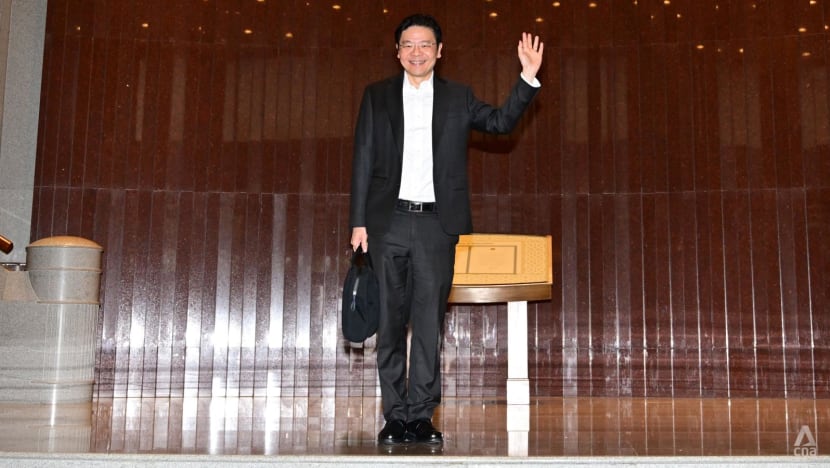Budget 2024: Focus on social issues, ‘all encompassing’ measures reflect ‘more consultative’ leadership, say analysts
A bulk of the Budget announcements addressed social issues raised during the Forward SG exercise.

Deputy Prime Minister and Finance Minister Lawrence Wong at Parliament House before delivering the Budget 2024 statement. (Photo: CNA/Gaya Chandramohan)

This audio is generated by an AI tool.
SINGAPORE: The slew of financial measures announced by Deputy Prime Minister Lawrence Wong at Budget 2024 on Friday (Feb 16) was “all encompassing” and addressed key societal shifts needed – notably those highlighted in the Forward SG exercise, said political analysts.
This gives the electorate a taste of the political leadership to come with Mr Wong set to be at the helm soon, they told CNA.
Prime Minister Lee Hsien Loong is expected to hand over leadership to Mr Wong, who is also Finance Minister, before November this year.
Among the measures announced were payouts to alleviate cost-of-living concerns, moves to help seniors age well and greater support for Institute of Technical Education (ITE) graduates.
“CONSULTATIVE” LEADERSHIP STYLE
Dr Mustafa Izzuddin, senior international affairs analyst at Solaris Strategies Singapore, said Mr Wong was able to deliver the Budget in a “relatable” manner.
The Deputy Prime Minister didn’t just announce various schemes, but explained their significance, why they are being offered and how they will be rolled out, noted the political analyst.
“Of course there are more details that will be revealed later – but it was enough for people to get a good sensing that it is an all-encompassing Budget, that there is something for everyone within the Budget.”
Rolling out the schemes that address concerns raised during Forward SG, which was chaired by Mr Wong, also reflects his style of leadership, said Dr Mustafa.
And that is “one that we can expect to be more consultative, more engaging, one that does listen and see where concerns are and try to address them”, he suggested.
The Budget was “a signal to showcase the 4G nous in using Singapore’s fiscal muscle to deal with immediate and over-the-horizon concerns”, added Associate Professor of Law at Singapore Management University (SMU), Eugene Tan.
“This is a Budget that they can bring to the electorate.”
HEAVY FOCUS ON SOCIAL ISSUES
Analysts pointed out that a bulk of the Budget measures were targeted at addressing social issues, from inequality to cost-of-living concerns.
The Budget was “a reflection of what Forward SG is all about”, said independent political observer, Dr Felix Tan.
It included efforts to “mitigate the situation” that Mr Wong observed, such as through on-the-ground engagement sessions during the 16-month exercise, said Dr Tan.
The Forward SG exercise, launched in June 2022 to review and refresh the "social compact", culminated in a report last October that laid out the roadmap for a new Singapore vision.
SMU's Assoc Prof Tan echoed that Forward SG was “front and centre” of this year’s Budget, driving it in “significant ways, with every segment of the population gaining from the Budget”.
With many “feel-good measures”, the entire Budget “stood out” to him as a “pro-social Budget". About three-quarters of the speech was devoted to social measures, he noted.
He pointed to the S$3.5 billion (US$2.6 billion) set aside over the next decade to help seniors age well; the Assurance Package that will be enhanced by a further S$1.9 billion to help offset higher GST expenses; help for young families which includes reduced monthly childcare fee caps in government-supported preschools; and the one-year Parenthood Provisional Housing Scheme (Open Market) Voucher to help more eligible couples rent a HDB flat in the open market.
Assoc Prof Tan also highlighted the “big investment” of S$40 billion by the end of the decade to “strengthen our social safety nets”.
“The welfarist orientation is evident and now a mainstay of the Budget”, he noted.
One “particularly strong concern” that the Budget addressed was inequality, added Dr Woo Jun Jie, a senior lecturer at the Lee Kuan Yew School of Public Policy (LKYSPP) under the National University of Singapore.
For example, the support for Institute of Technical Education (ITE) graduates and financial top-ups for lower-income families are “clear efforts” by the government to “level the playing field for lower-income workers and families”, he said.
Such measures stemmed from Forward SG findings that highlighted a need for Singapore society to respect and reward every job.
“With regards to cost-of-living measures, the measures introduced represent an extension of ongoing efforts to provide financial support to households and individuals, particularly needy ones,” added Dr Woo.
“These are very targeted measures that focus on providing support for day-to-day needs such as food, groceries and utilities.”
POSITIONING SINGAPORE FOR THE FUTURE
Some analysts also pointed to how Mr Wong had positioned Singapore’s economy for the future.
Dr Mustafa noted that various schemes announced were meant to get society “motivated to work and also be able to have a family, and with that sort of work-life balance, grow Singapore’s economy further”.
He also highlighted Mr Wong’s mention of the need to guard against complacency and continue being ahead of the curve as far as the economy is concerned.
“That will require, obviously, the people in the country to be motivated to work. And not just to work, but to also reskill and upskill themselves,” he said.
Meanwhile, LKYSPP’s Dr Woo observed “some rather bold moves”, including the “substantially higher” SkillsFuture Credit top-up targeted at mid-career workers in their 40s and above.
This group will get S$4,000 to spend on selected training programmes to give them better employability outcomes.
Another bold move, he noted, is a new refundable tax credit given to certain companies to help Singapore remain competitive and continue to attract high-quality investments.
“These are substantial investments that are targeted towards strengthening businesses and enhancing the quality of our workforce, both aspects which will be important for driving Singapore's continued economic growth and transformation,” he explained.
The fact that the Budget had a breadth of coverage and yet was targeted in its measures reflected the “bold yet prudent approach” to tackling Singapore’s present and future challenges, Dr Woo added.
“These measures will play a big part in ensuring social and economic stability during the leadership transition that is expected to take place soon,” he said.






















